Did you hear the one about the group of Cuban-American businessmen who went to Havana and had such a good time, they came back and bought a page in the Miami Herald to 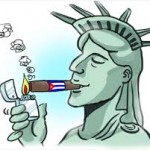 tell the rest of us how wonderful everything is on the Communist-run island?
tell the rest of us how wonderful everything is on the Communist-run island?
It’s not a joke.
The 10 signers to the open letter describe themselves as exiles and children of exiles and, on page 13A in my Sunday paper, they wax on and on and on about how President Obama’s “new policy of engagement” — which reached its first anniversary last week — is a shift whose time has come and that has already benefited the Cuban people.
There are Cuban entrepreneurs starting their own software companies. There are farmers selling their goods to Cubans at market rates and mothers with restaurants. There’s a beauty salon cooperative 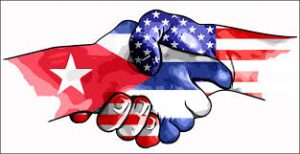 “allowed to grow unabated to more than 100 partners,” and a textile factory where former government workers work weekends filling orders and now earn three times their former government salary.
“allowed to grow unabated to more than 100 partners,” and a textile factory where former government workers work weekends filling orders and now earn three times their former government salary.
Key word: Allowed. They actually wrote that as something to celebrate.
What they didn’t say was that the average Cuban government salary in Cuba — which is still the main employer by far — is between $20 and $30 a month. What they didn’t say was that they were celebrating these people making $90 a month.
“We saw progress beyond what we could have imagined,” they penned in this open letter.
But maybe that’s only because they never went before. Their imaginations were stuck because they couldn’t make a buck.
What they didn’t say was that many of these businesses have been existing — albeit illegally — decades before the negotiations with the U.S. to re-establish relations began. I had my hair cut and done at a beauty salon cooperative in 1993, paying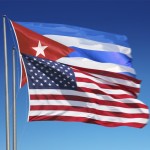 the hairdresser directly, using the salon off hours. My father-in-law owned a video rental store he ran out of his government-issued apartment until he came here in 2006. The lady down the street sewed underwear and bras.
the hairdresser directly, using the salon off hours. My father-in-law owned a video rental store he ran out of his government-issued apartment until he came here in 2006. The lady down the street sewed underwear and bras.
Cubans have always had the entrepreneurial spirit. It was illegal. But they had it and businesses thrived. My father–in-law had more than 600 movies at one point. The difference is these outlaw businesses made the government irrelevant. And that made business relations with U.S. companies near to impossible.
What these 10 business people are celebrating is that now the government is involved. It is “adopting positions of change” — which provides them with opportunities to invest.

What these business people do not say is that there is no change when it comes to freedom of speech or freedom of association or free elections. People are still jailed and beaten for what they think and say. Everybody says that famous line of Obama’s, that nobody expected transformation overnight. But, at least “in the first six months of Mr. Obama’s normalization of relations with the Communist regime, most indicators of human rights on the island have moved in the wrong direction.”
That’s from a Washington Post editorial in July.
A report delivered to the InterAmerican Press Association in October, ten months after what some Cuban activists call the U.S.’s surrender to Cuban apartheid, said that freedom of the press in Cuba was still an issue.
“In Cuba, despite the reestablishment of relations between the Cuban and U.S. governments, little progress has been made in freedom of expression, freedom of association and freedom of the press, and two journalists remain behind bars. The methods of repression include censorship of critical websites, inspection of emails, suspension of mobile phone service and physical and verbal attacks on activists and independent journalists.”
But there are 55 new WiFi hotspots! The businessmen wrote about those in the open letter and you can almost hear their bated breath. Such excitement!
Nevermind that these WiFi spots aren’t for everybody. Not all 12 million or so Cubans have access. The 10 businessmen don’t address that.
They don’t address the repression that activists say have increased since the olive branch was extended from Washington. They don’t address the more than 3,000 political jailings, which include 641 in May — a full five months after normalization began. They don’t address the 20 or more dissident “detainees” who needed medical attention from their beatings. They don’t address the systematic detention of the Ladies in White as they march peacefully to demand the release of their brothers, husbands, fathers, held for political reasons. They don’t address the Cuban government thugs that attacked Miami exile activists when Cuba was invited for the first time to the Summit of the Americas in Panama. They don’t address the thousands of Cubans who have fled the island since the U.S. started talking to the Castros again, including 6,000 people stuck in Costa Rica.
say have increased since the olive branch was extended from Washington. They don’t address the more than 3,000 political jailings, which include 641 in May — a full five months after normalization began. They don’t address the 20 or more dissident “detainees” who needed medical attention from their beatings. They don’t address the systematic detention of the Ladies in White as they march peacefully to demand the release of their brothers, husbands, fathers, held for political reasons. They don’t address the Cuban government thugs that attacked Miami exile activists when Cuba was invited for the first time to the Summit of the Americas in Panama. They don’t address the thousands of Cubans who have fled the island since the U.S. started talking to the Castros again, including 6,000 people stuck in Costa Rica.
These people — Cubans who live in Cuba, by the way, and don’t just travel there as business tourists on a sunny government-controlled itinerary — don’t seem to have the same opinion or hope about the changes taking place as these 10 men.
Or maybe those are the “myths we hear in our community [that] suggest economic reforms taking place in Cuba are only cosmetic, merely new window dressing on an old approach,” as they wrote in the open letter.
These 10 businessmen who went to Cuba and suddenly know so much more than the rest of us are:
- Ralph Patino, President and COO of Patino & Associates law firm
- Ariel Pereda, chairman of Engage Cuba Council, a longtime facilitator of trade with Cuba
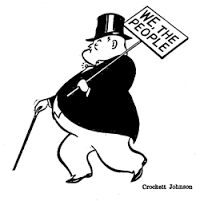
- Joe Arriola, chairman of the Jackson Public Health Trust Board of Trustees
- Manny Medina, founding and managing partner of Medina Capital
- Enrique Sosa, board member of a chemical manufacturing company that works with food and beverage producers and who also has long been an anti-embargo activist
- David Hernandez, CEO of Liberty Power
- Juan G. Espinosa, CEO of The Espinosa Group Inc. (business development and construction)
- John McIntire, chairman of Cuba Emprende Foundation, which, before the December approach, assured Cuban officials that they were only looking to incubate small businesses in line with the government’s stated economic policy.
- And Miguel “Mike” Fernandez, CEO of MBF Healthcare and Carlos Gutierrez, former Secretary of Commerce and co-chair of the Albright Stonebridge Group, who paid for the ad.
What do these people have in common? That they all look out for the bottom line. And that’s what they are doing with this letter, too. You can tell because it is all about business and entrepreneurship. As if nothing else matters.
I agree that an increase in business freedom is a good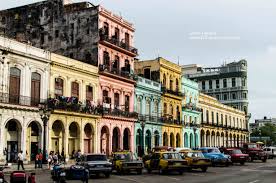 thing. But there is a problem when Cubans on the island are not on a level playing field and only “good little communists” get to play the new relations game and dissident journalists or activists or people with independent thought and a big mouth about human rights abuses need not apply. This is not okay. And Mike Fernandez & Co. ought to say so. They ought to say that these alleged economic reforms should be for everyone — and should come with other liberties that consumers around the world enjoy.
thing. But there is a problem when Cubans on the island are not on a level playing field and only “good little communists” get to play the new relations game and dissident journalists or activists or people with independent thought and a big mouth about human rights abuses need not apply. This is not okay. And Mike Fernandez & Co. ought to say so. They ought to say that these alleged economic reforms should be for everyone — and should come with other liberties that consumers around the world enjoy.
But maybe that wouldn’t be in the best interest of their business. You see? In the Castro’s Cuba, which the island still very much is, you have to play by their rules to get anything. I can’t help but wonder if this open letter to their fellow Cuban-Americans was a suggestion of their Cuban government handlers. You know? Officials or spies who make sure the businessmen see only what the government wants them to see.
Not that they needed to hand out rose-colored glasses. These businessmen went to Cuba with their own goggles — tinted green. And that is why their pricy open letter doesn’t mention political prisoners, human rights or democracy. Their bottom line is the bottom line.  Now that the government is involved in making businesses legal, only now can they cash in on it. If my father-in-law were still in Havana, maybe he could get a micro loan from one of these guys.
Now that the government is involved in making businesses legal, only now can they cash in on it. If my father-in-law were still in Havana, maybe he could get a micro loan from one of these guys.
These businessmen can’t wait to get some of those Cuban dollars, which Cubans on the island still get mostly from Cuban-Americans in Miami.
Yes, Cubans still operate in dollars, not pesos. That’s not a change. I paid my hairdresser in dollars in 1993, but it was illegal then. I guess we can celebrate the fact that the Cuban regime was forced to make the dollar legal.
Except that otherwise they would have run out of space in their jails for political dissidents.
And they would not have had anybody left around to call entrepreneurs.

